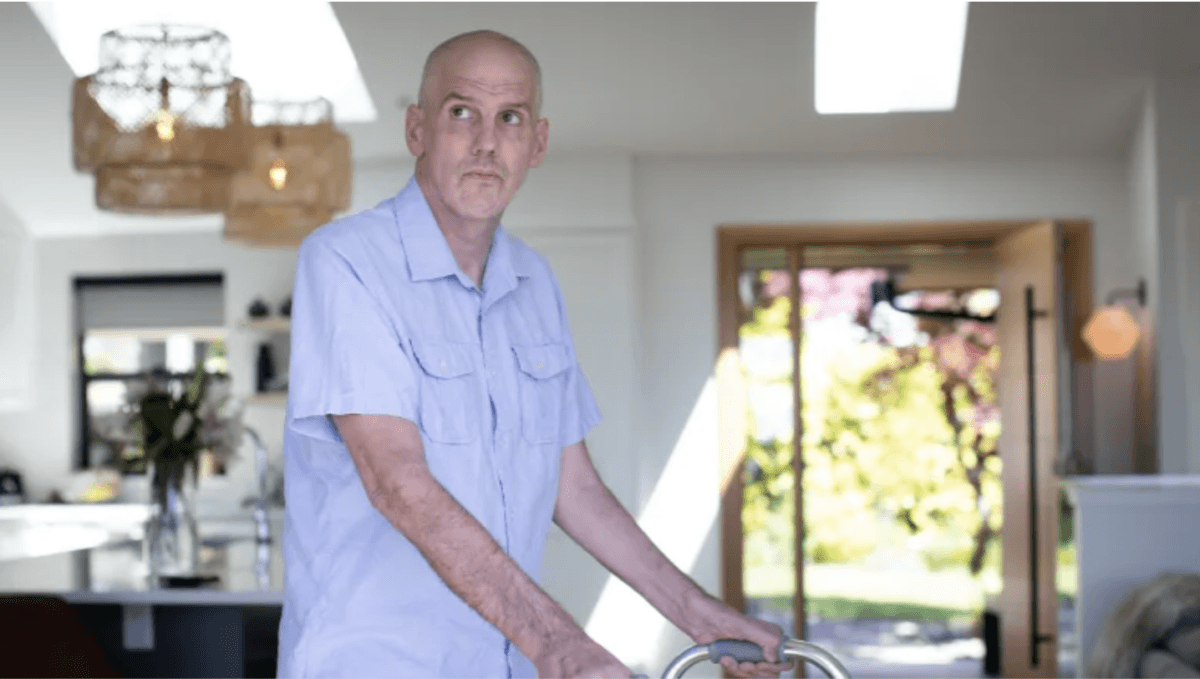
People affected by ALS applaud provincial funding to support local clinical trials, research centre
Published in CBC News May 21, 2021, written by Cathy Browne
Greg Gowe was diagnosed with ALS two years ago and now uses a walker or wheelchair to move around. He’s pictured in his North Vancouver home on May 14. (Maggie MacPherson/CBC)
People in B.C. with ALS have had to travel long distances for potentially life-changing treatments
For the first time in nearly a decade, B.C. residents living with amyotrophic lateral sclerosis, also known as ALS, can look forward to the resumption of clinical trials in their home province.
The provincial government has announced it is providing an additional $2 million to increase access to clinical trials, conduct more research and further support patients living with ALS in B.C. Last year, the province also gave $1 million to the ALS Society in the summer of 2020 to support its Project Hope fundraising efforts, which now totals $5.3 million.
The money will establish an ALS research fellowship at the University of British Columbia.
The research clinician will work out of the Djavad Mowafaghian Centre for Brain Health (DMCBH) at UBC and scientists will also work on Alzheimer’s and Parkinson’s research, which will provide an opportunity for collaboration between these three neurodegenerative diseases.
400 people in B.C. live with ALS
“Clinical trials are essential to drug development and confirming that treatments work to get them approved,” said Dr. Hannah Briemberg, medical director of the ALS clinic at the G.F. Strong Rehabilitation Centre in Vancouver. “But also when you have a disease where you are realistically facing losses virtually every day, the ability to be proactive and be involved in something positive that is aiming to try to arrest the process, or slow the process, is I think, phenomenally therapeutic for people.”
It’s welcome news for the 400 people living with ALS in B.C., and for their families, who’ve had to access potentially life-changing treatments and therapies far from home — even in the midst of this pandemic year. Being able to access a clinic close to home would lessen the health and safety issues associated with travel, especially now.
For North Vancouver lawyer and dad Greg Gowe, the process has been overwhelming.
Gowe was diagnosed with ALS two years ago, at the age of 48. (Maggie MacPherson/CBC)
“Two years ago, I was a practising lawyer, and a baseball coach, and really active in the lives of my two kids, ” Gowe said. “That all changed with my ALS diagnosis at the age of 48. It was devastating.”
Equally crushing was the realization that clinical trials weren’t available in B.C.
Gowe turned to Google, and found an article online about Dr. Angela Genge at the Montreal Neurological Hospital, who was offering clinical trials, and hope.
“I emailed her on a Friday night and she replied the next day, asking how soon I could get to Montreal,” Gowe recalled. “My wife Adrienne and I flew out the following week.”
‘I’m living on borrowed time’
Over the past two years, he’s flown back and forth to Montreal 17 times. And recently Edmonton was added to the itinerary for another clinical trial.
“I’m done travelling,” he said.
Gowe wants the provincial government and UBC to act swiftly to hire a research clinician and start up clinical trials within months, not years. Time, he noted, is something people living with ALS don’t have.
“What we can’t have happen now, and what I fear, is that we will continue to unnecessarily lose time as we move forward with ALS treatment options,” Gowe said.
“I’m living on borrowed time, and it doesn’t have to be that way,” he continued. “If the government, UBC and the other stakeholders apply a COVID mentality to ALS, there’s the possibility that we can start saving lives and finding a way out of the devastation that this disease has been bringing for decades.”
But that’s not the case right now.
“We’re not currently living with our disabilities, we’re dying with our disabilities.”
Join our fight to #EndALS!
Sign up as to receive periodic email updates and join our circle of supporters!
